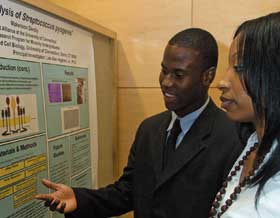  |
| HOME | THIS ISSUE | CALENDAR | GRANTS | BACK ISSUES | < BACK | NEXT > |
Summer funding helps graduate students develop mentoring skillsby Cindy Weiss - August 27, 2007 | ||||
| Graduate students in the sciences and those with an interest in environmental research received a shot of financial support this summer to develop their skills mentoring undergraduates and collaborating with researchers in other fields. The College of Liberal Arts and Sciences (CLAS), through its donor-supported Fund for Innovative Education in Science, provided more than $40,000 in summer support for a pilot program that paired graduate student mentors with minority undergraduates doing scientific research with CLAS faculty. An additional $33,000 was provided by the Vice Provost for Research and Graduate Education and the Graduate School, so that 30 graduate students could learn to be research mentors. The funds also were used to supplement National Science Foundation summer research stipends to six of the undergraduates that the students mentored. The undergraduates came from the Northeast Alliance Summer Research Program for Underrepresented Minorities at UConn, a program started last year by Ruth Washington and Lee Aggison, associate professors-in-residence in the Department of Molecular and Cell Biology, to encourage minority students to choose careers in science. The Center for Environmental Sciences and Engineering, in another effort, provided $125,000 in awards this summer for graduate students who proposed multidisciplinary environmental research projects requiring them to work with faculty from at least two departments and, in some cases, from different schools and colleges. The awards provided critical summer support for graduate students, many of whom are paid teaching assistants during the regular school year but lack support in the summer. “This provided an important bridging resource,” says Michael Willig, director of the Center for Environmental Sciences and Engineering. More important, he says, the awards stimulated students to go beyond their disciplinary boundaries and collaborate with researchers in other fields. The future of much environmental research is at the interface between disciplines, he notes. The Center’s program, which will be repeated next summer, benefited 24 graduate students, including 13 in CLAS, as well as students in the School of Engineering and the College of Agriculture and Natural Resources. Undergraduate students participating in summer research at UConn have become a common sight, some coming from other institutions under NSF sponsorship to take part in Research Experience for Undergraduates programs, others supported by UConn’s Summer Undergraduate Research Fund. The new wrinkle this year was the training provided graduate students, who work most closely with the undergraduates in the lab. “We tried to work toward teaching them to teach,” says Debra Kendall, associate dean of liberal arts and sciences and Board of Trustees Distinguished Professor of Molecular and Cell Biology.
Some of this would have happened anyway, she notes, but the Fund for Innovative Science enabled CLAS to provide more structure, with faculty-run workshops for the graduate students and an opportunity for them to learn from each other and to think about how to encourage their undergraduates to continue to graduate school. “The coaching, the discussions – when a student asks about where they should go to graduate school – help tremendously in getting students excited about a career in science,” she says. The mentoring meshed with the Fund for Innovative Education in Science’s goal of supporting projects that take advantage of the synergy between research and teaching. The fund was endowed by private donors in part to capitalize on the University’s strength as a research institution and to train graduate students to become effective teachers. An additional $60,000 from the fund is expected to be used next spring for another graduate student mentor training program in CLAS. Marsenia Harrison, a first-year Ph.D. student in molecular and cell biology and one of the graduate student mentors, says she found that being a mentor “is not a simple task,” but it was one in which she took great pride. She mentored Makenson Delroy, a biomedical engineering major at UConn who plans to go on to graduate school for a Ph.D. Harrison earned her bachelor’s degree at Stillman College. After earning her Ph.D., she hopes to return to Atlanta to do research for the Centers for Disease Control. At a closing ceremony for the Northeast Alliance students and mentors this summer, she told the undergraduates that their parents, teachers, and graduate student mentors had helped construct bridges for them. “None of us would trade this summer’s experiences,” she said. “Now you can build your own bridges.” To hear Harrison talk about her experiences as a mentor and Northeast Alliance student Alvin Thomas comment on his summer of research in clinical psychology, go to www.clas.uconn.edu and click on CLAS Focus. |
| ADVANCE HOME UCONN HOME |

